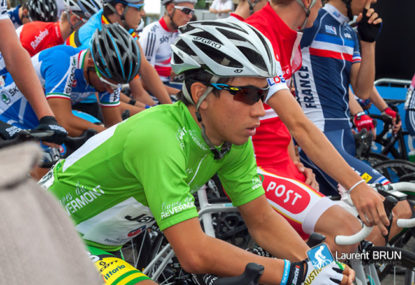'I've just won a stage of the Tour de France, mate!': Hindley grabs yellow jersey as Aussie blows Tour apart
Australia's Jai Hindley has said he is "lost for words" after a shock stage victory at the Tour de France earned him the leader's…

Despite two top ten finishes, young Australian speedster Caleb Ewan is struggling to make an impact at the pointy end of the Giro d’Italia’s sprint stages.
And while the Orica-GreenEDGE rider is not alone on that score – with German superstars Marcel Kittel (Etixx-QuickStep) and Andre Greipel (Lotto-Soudal) dominating the flat stages – his failure to even be in contention for the minor placings highlights the gulf that exists between teams entirely dedicated to their sprinters and teams that aren’t.
Make no mistake; this is not a criticism of Ewan. The 22-year-old is still learning his craft and the knowledge he takes away from this Giro will be invaluable.
On each of the flat stages he has been with the lead group of sprinters at the end, but when the heavy hitters have exploded into full sprint mode, the young Aussie has been just a few wheels too far back to have any real impact.
Once again, he is not alone in this, and when class sprinters like Arnaud Demare (FDJ) and Elia Viviani (Sky) are left battling it out for the minor placings time after time, it gives some indication of the rare form that both Kittel and Greipel are in.
Before this Giro started I was confident that Ewan could win a stage or two to go with his Vuelta victory over Peter Sagan and John Degenkolb last year. Now I’m not so sure. I haven’t written him off completely because he is too talented a rider to be totally dismissed, but without the support from Orica-GreenEdge that Kittel and Greipel get from their teams, it is going to be hard work.
For Etixx-QuickStep and Lotto-Soudal, sprinting is their bread and butter. Their one and only goal in Grand Tours is stage wins and it is not by accident that they provide their fast men with the strongest and most highly drilled lead out trains.
They have turned sprinting into an art form. It is not easy to find cohesion in the chaos of the last hectic kilometres of a flat stage, but these teams do it. They soak up the bruising brutality of the swirling peloton, defy physics as they sweep around bends and road furniture that has no business being anywhere near a bike race when it is at its fastest, and pilot their sprinter unscathed to the perfect launching spot almost every time.
Their dedication to the cause is both fearless and selfless. And when you have the likes of Kittel or Greipel to finish off all your hard work, it also becomes highly rewarding.
Success breeds success. Give these teams a sniff of victory and they’ll chase it down. What sets them apart from the others though is that they have the resources to make it happen – and by resources I mean a sprint dedicated lead out train.
Unfortunately for riders like Caleb Ewan and Elia Viviani, their teams’ focus in this race is on the hairpin bends of the mountains rather than the hurly burly of the sprints. As a result their squads carry a different breed of domestique, ones that can support General Classification riders on torturous climbs and keep them out of wind and trouble at all other times. The needs of the speedster become secondary.
The General Classification rider is the bane of the sprinter’s life, sucking up support and resources as the team chases a good overall result rather than the short term glory of a stage win.
But it is not all bad. In fact it can be a good thing to go into a race without support. It teaches a young sprinter how to scrap and fight for position, how to read a race and follow the right wheels, and how to make the most of every opportunity, no matter how small. It gives them an appreciation of the work and sacrifice that is needed to achieve results at the top level.
Most of all they learn not to take their wins for granted. After all, it’s hard to get ahead of yourself if you’re getting battered from pillar to post on a regular basis!
Of course some sprinters excelled without support. Racers like Robbie McEwen regularly surfed to victory following the wheels of opposition sprinters and their trains. Mark Cavendish at his best could do it as well. The trick is knowing who to follow and when.
It’s time for Ewan to try and do something similar. His limited support from Orica-GreenEdge will only take him so far. If he wants to really make an impact on this Giro then it’s time to strike out on his own.
All of which makes it no easier for a kid in just his second Grand Tour.